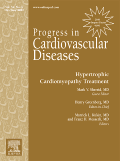
PROGRESS IN CARDIOVASCULAR DISEASES
Scope & Guideline
Unveiling Innovations in Heart Health
Introduction
Aims and Scopes
- Cardiovascular Disease Prevention and Management:
The journal focuses on innovative strategies for preventing and managing cardiovascular diseases, including lifestyle interventions, medical therapies, and rehabilitation programs. - Epidemiology and Public Health:
Research on the epidemiological trends of cardiovascular diseases, including the impact of social determinants of health and health disparities among different populations. - Technological Advances in Cardiology:
Exploration of cutting-edge technologies and methodologies in cardiovascular diagnostics and treatment, such as imaging techniques, artificial intelligence, and novel therapeutic devices. - Patient-Centered Care and Health Equity:
Emphasis on patient-centered approaches in cardiovascular care, addressing health equity, and the unique needs of diverse populations. - Exercise and Physical Activity:
Investigation into the role of exercise and physical activity in cardiovascular health, including rehabilitation, preventive measures, and the physiological impact of exercise. - Pharmacotherapy and Clinical Trials:
Evaluation of pharmacological interventions, including new drug therapies, their efficacy, safety, and implications based on clinical trials. - Emerging Cardiovascular Research Areas:
Inclusion of novel research topics such as the interplay between cardiovascular health and mental health, the role of nutrition, and the impact of chronic conditions on cardiovascular outcomes.
Trending and Emerging
- Cardiovascular Health and COVID-19:
A significant increase in research related to the cardiovascular implications of COVID-19, including its long-term effects on heart health and strategies for managing cardiovascular risks in the pandemic context. - Integrative Approaches to Cardiovascular Care:
Emerging strategies that combine lifestyle interventions, psychological support, and community resources to enhance cardiovascular health outcomes. - Health Equity and Social Determinants:
A growing focus on the impact of social determinants of health and health disparities in cardiovascular disease prevention and management, emphasizing the need for equitable healthcare access. - Artificial Intelligence and Machine Learning:
The integration of artificial intelligence and machine learning in cardiovascular research and clinical practice, showcasing their potential for improving diagnostics and treatment efficacy. - Personalized Medicine in Cardiology:
An increasing interest in personalized medicine approaches, including genetic profiling and individualized treatment plans tailored to patient-specific characteristics. - Role of Nutrition and Lifestyle Factors:
Heightened research interest in the effects of diet, nutrition, and lifestyle factors on cardiovascular health, particularly in relation to chronic disease management. - Telemedicine and Remote Monitoring:
The rise of telemedicine and remote patient monitoring as essential components of cardiovascular care, particularly in the context of the COVID-19 pandemic and beyond.
Declining or Waning
- Traditional Risk Factor Assessment:
The focus on conventional risk factors for cardiovascular disease, such as cholesterol levels and hypertension, appears to be waning in favor of more holistic and multifactorial approaches to risk assessment. - Invasive Cardiac Procedures:
There is a noticeable decline in the emphasis on traditional invasive procedures and interventions, as newer, less invasive techniques and technologies gain traction. - Single-Disease Focus Studies:
Research that strictly adheres to studying isolated cardiovascular diseases is becoming less prevalent, with a broader interest in comorbidities and their interconnectedness. - Pharmaceutical Monotherapy:
The trend of focusing solely on single-drug therapies is decreasing, as there is a growing recognition of the need for combination therapies and lifestyle modifications. - Static Guidelines and Protocols:
The reliance on static clinical practice guidelines without consideration for personalized medicine is diminishing, as there is a push towards individualized treatment approaches.
Similar Journals

Arquivos Brasileiros de Cardiologia
Fostering collaboration and innovation in cardiovascular health.Arquivos Brasileiros de Cardiologia is a leading open-access journal dedicated to advancing the field of cardiology and cardiovascular medicine. Established in 1950 and published by the ARQUIVOS BRASILEIROS CARDIOLOGIA, this Brazilian journal plays a crucial role in disseminating high-quality research that addresses both emerging and established topics in cardiovascular science. With an impressive history and a commitment to open access since 1997, it provides researchers, healthcare professionals, and students with free and readily available content that significantly contributes to the understanding and management of cardiovascular diseases. The journal is indexed in Scopus and holds a Q3 ranking in the category of Cardiology and Cardiovascular Medicine, demonstrating its relevance and participation within the global research community. Researchers can submit their work and access a wealth of information that spans a variety of subfields, reflecting the journal’s dedication to fostering innovation and collaboration within cardiology. With a mailing address at Avenida Marechal Câmara, 160-330 Centro, Rio de Janeiro, RJ 20,020-907, Brazil, the journal continues to serve as a vital platform for scholarly communication and knowledge exchange in the cardiovascular realm.

Current Cardiology Reports
Connecting research and practice for optimal heart health.Current Cardiology Reports, published by Springer, is a leading peer-reviewed journal dedicated to advancing the field of cardiology and cardiovascular medicine. With its ISSN 1523-3782 and E-ISSN 1534-3170, the journal offers a platform for researchers and practitioners to share innovative research findings, clinical insights, and comprehensive reviews, contributing to the ongoing dialogue in cardiovascular health. Recognized for its high impact, Current Cardiology Reports holds a prestigious Q1 ranking in the Cardiology category for 2023 and ranks #83 out of 387 in Scopus, placing it in the 78th percentile among journals in its field. The journal, converging its insights from 1999 to 2024, aims to disseminate valuable knowledge that can inform clinical practice and influence future research directions. Although not an Open Access journal, the rich content and timely articles published within its pages are invaluable to both seasoned professionals and emerging scholars in cardiology. Based in New York, United States, the journal continues to play a critical role in shaping cardiovascular medicine through rigorous scientific inquiry and education.

TRENDS IN CARDIOVASCULAR MEDICINE
Pioneering Insights for a Healthier HeartTRENDS IN CARDIOVASCULAR MEDICINE, published by Elsevier Science London, stands at the forefront of the cardiology field, with a commendable Q1 ranking in the category of Cardiology and Cardiovascular Medicine. Since its inception in 1991, this esteemed journal has provided a vital platform for disseminating cutting-edge research and innovative clinical practices, reflecting the dynamic developments in cardiovascular health. With an impact factor positioning it among the top 3% in its category, TRENDS IN CARDIOVASCULAR MEDICINE is essential reading for researchers, healthcare professionals, and students pursuing the latest advancements and evidence-based approaches in cardiology. Although this journal does not currently operate under an open-access model, its rich array of content encompasses a variety of topics from clinical studies to reviews, ensuring readers stay informed on the pivotal trends that shape cardiovascular medicine. This commitment to excellence underscores the journal's role as a premier resource for anyone dedicated to improving cardiovascular health.
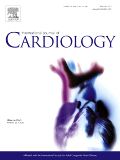
International Journal of Cardiology
Leading the Charge in Heart Health InnovationsThe International Journal of Cardiology is a premier publication in the field of Cardiology and Cardiovascular Medicine, published by Elsevier Ireland Ltd. With an impressive impact factor and ranked in the top quartile (Q1) of its category, this journal serves as a vital resource for researchers, clinicians, and scholars committed to advancing cardiovascular health. Founded in 1981, the journal has been pivotal in disseminating significant findings, with a wide-ranging scope that includes original research, reviews, and clinical studies aimed at improving patient outcomes and understanding heart diseases. Its robust ranking of #73 out of 387 in Scopus ensures that it remains a leading platform for impactful cardiovascular research. While currently not an open-access publication, the journal's commitment to quality and relevance makes it an essential reference point within an ever-evolving medical landscape. For those engaged in cardiovascular research, the International Journal of Cardiology is not just a journal; it's an indispensable source of knowledge shaping the future of heart health.
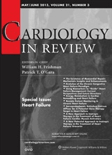
Cardiology in Review
Empowering professionals with essential cardiology insights.Cardiology in Review, published by Lippincott Williams & Wilkins, is a prominent journal focused on advancing the field of cardiology and cardiovascular medicine. With a history of publication spanning from 1995 to 2024, the journal serves as an essential resource for researchers, healthcare professionals, and students alike, offering in-depth reviews and analyses on the latest developments, clinical practices, and research findings in cardiology. Despite being a traditional print journal, it maintains a commendable Q2 ranking in both cardiology and miscellaneous medicine categories as of 2023, reflecting its influence and rigor in the academic community, with a Scopus rank of #132 out of 387 in its field, placing it in the 66th percentile. The journal aims to bridge the gap between clinical practice and emerging research, promoting a deeper understanding and integration of innovative strategies in cardiovascular care. With its commitment to high-quality scholarship, Cardiology in Review remains a vital conduit for knowledge and dialogue within the evolving landscape of cardiovascular health.

Cardiology Research
Driving the dialogue in cardiology and cardiovascular care.Cardiology Research is a prominent open-access journal dedicated to advancing the field of cardiology and cardiovascular medicine, published by ELMER PRESS INC. Renowned for its rigorous peer-review process, the journal provides a platform for cutting-edge research and innovative clinical practices in cardiology. With an ISSN of 1923-2829 and an E-ISSN of 1923-2837, it has established an impactful presence in the academic community, achieving a 2023 Scopus quartile ranking of Q3 in its category, positioning it in the 41st percentile. The journal's scope encompasses various aspects of cardiology research, including but not limited to epidemiology, diagnostics, therapeutics, and cardiovascular interventions. Although it operates without open access in certain contexts, it provides flexible access options for readers, ensuring that its valuable insights are widely disseminated. Cardiology Research is an essential resource for researchers, healthcare professionals, and students who aspire to stay at the forefront of cardiovascular science, contributing significantly to the global discourse on heart health.
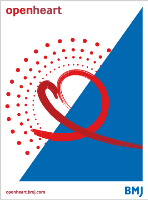
Open Heart
Exploring Innovations in Heart HealthOpen Heart is a prestigious, peer-reviewed open access journal published by BMJ Publishing Group, focusing on the dynamic field of Cardiology and Cardiovascular Medicine. Launched in 2013, the journal has rapidly ascended to prominence, achieving a Q1 quartile ranking in its category as of 2023, reflecting its high-quality scholarly contributions. With an active publishing history from 2014 through 2024, Open Heart offers an expansive platform for researchers, clinicians, and students to disseminate and access groundbreaking research findings, reviews, and case studies that address critical issues in cardiovascular health. The journal is indexed in Scopus, ranking 133rd out of 387 in the Medicine - Cardiology and Cardiovascular Medicine category, placing it within the 65th percentile of its peers. Based in the United Kingdom, it promotes global research and collaboration in the cardiovascular domain, ensuring open access to vital knowledge for all stakeholders in the medical community. For access options and more information, visit the Open Heart website.
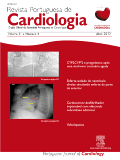
Revista Portuguesa de Cardiologia
Transforming cardiovascular medicine with cutting-edge research.Revista Portuguesa de Cardiologia, published by Elsevier España SLU, stands as a pivotal resource in the realm of Cardiology and Cardiovascular Medicine. With its origins tracing back to 1970, this journal has cultivated a robust academic presence, achieving a 2023 Q3 ranking in its category, and currently holding a position of #220 out of 387 on the Scopus rankings, placing it within the 43rd percentile of its field. This open access journal, available since 2011, aims to disseminate high-quality research and insights relevant to contemporary cardiovascular issues. Its commitment to accessibility and knowledge exchange enhances its importance for clinicians, researchers, and students alike, fostering a more informed community in the fight against cardiovascular diseases. Operating from its base in Barcelona, Spain, the journal welcomes contributions that further the understanding and treatment of heart conditions, contributing significantly to the advancement of cardiovascular health.

Journal fur Kardiologie
Nurturing Progress in Cardiovascular Medicine.The Journal fur Kardiologie, published by KRAUSE & PACHERNEGG GMBH, is a pivotal resource in the field of Cardiology and Cardiovascular Medicine. With an ISSN of 1024-0098 and an E-ISSN of 1680-936X, this journal has played a significant role in disseminating valuable research and clinical studies from 1998 until its coverage discontinuation in Scopus in 2017. Despite its Scopus rank being relatively low at #316/324 in its category, it continues to serve as a platform for emerging cardiology research. The journal’s scope encompasses various aspects of cardiovascular health, providing insights that are crucial for researchers, professionals, and students alike seeking to advance their knowledge and practice in cardiology. While the journal is not open access, its contributions to the field are essential for those looking to stay informed about the latest developments in cardiovascular medicine.
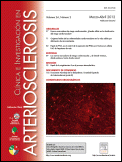
Clinica e Investigacion en Arteriosclerosis
Unveiling the latest breakthroughs in arterial health.Clinica e Investigacion en Arteriosclerosis is a premier academic journal dedicated to the field of cardiology and cardiovascular medicine, published by ELSEVIER. With its ISSN 0214-9168 and E-ISSN 1578-1879, the journal aims to disseminate high-quality research and innovations in the understanding and treatment of arterial diseases, contributing significantly to both clinical practices and pharmacological advancements. Established in 2007 and continuing into 2024, the journal has garnered recognition with a notable Q3 categorization in both Cardiology and Cardiovascular Medicine and Pharmacology (medical) for 2023, reflecting its impact in the academic community. Researchers and healthcare professionals utilizing this journal will find a diverse range of articles exploring novel therapeutic strategies and epidemiological data, making it an essential resource for advancing knowledge and practice in cardiovascular health. While it does not operate as an open-access journal, the findings published in Clinica e Investigacion en Arteriosclerosis are pivotal for understanding current trends and future directions in cardiovascular research.